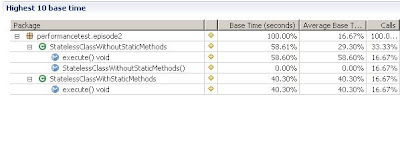Introduction
We
talked about Strings operations in the last article, now we will talk about
more tips on performance tips, we will talk about the importance of creating
stateless methods and class if your logic doesn't depend on the state of the
object, also we will talk about object reusing and how will affect the
performance by reducing the headache of garbage collection.
Take
'State or Stateless' Decision
Creating
and destroying objects issue in java can cause performance issues, for example
creating State classes for stateless data; a stateless class means that the
data of the created object doesn't depend on the state where there is no fields
or attributes that makes an object differs from other.
We can imagine that the Stateless class can say 'Use
me only if your code doesn't depend on your object state, All the objects are
functionally equivalent to me, you will gain besides that no creation of
objects, the CPU will be happy of doing that J'
Code Example
The following StatelessClassWithoutStaticMethods class has a
method called execute, where the logic of this method doesn't depend on the
state of the object, while it is not static method.
package
performancetest.episode2;
public
class StatelessClassWithoutStaticMethods {
public
void execute()
{
// the logic here doesn't depend on
the object state
for (int
i = 0; i < 10000; i++) {
System.out.println(i);
}
}
}
While the right version as the
following:
package
performancetest.episode2;
public
class StatelessClassWithStaticMethods {
public
static void
execute()
{
// the logic here doesn't depend on
the object state
for (int
i = 0; i < 10000; i++) {
System.out.println(i);
}
}
}
Performance Analysis
Using TBTB (Eclipse Test & Performance Tools
Platform Project), the following results are shown as follows
 |
| Performance Analysis |
Based
on this figure, the static execute method has loss approximately 18% of time
from the non-static one.
That
doesn't mean that you have to make all the class a static (i.e. a class has
static methods only), but if you have a state method in this class depends on
the object state, make this method only non-static.
Don't
Create A New One If You Can What You Have
'You
can use me before I go to the garbage collection, clear my data and reuse me
again; we want to lessen the work on our friend garbage collection' Any object
says this quote J, Creating new objects is expensive as we know as more
objects we create, the garbage collection job will be more time consuming.
So if
you have a chance to reuse the object again without creating a new one of the
same type, do it immediately, it will improve the performance and will make the
garbage collection job be easier.
Code
Example
public
static void
fillVectorDataWithoutRecycling()
{
for (int
i = 0 ; i < 1000 ; i ++)
{
Vector v = new
Vector();
v.add("item1");
v.add("item2");
v.add("item3");
System.out.println(v.get(0));
}
}
public
static void
fillVectorDataWithRecycling()
{
Vector v = new
Vector();
for (int
i = 0 ; i < 1000 ; i ++)
{
v.clear();
v.add("item1");
v.add("item2");
v.add("item3");
System.out.println(v.get(0));
}
}
We have
two methods, fillVectorDataWithoutRecycling method creates a new vector object
in the loop, while fillVectorDataWithRecycling method uses one vector object
and clears the vector object and reuse it.
Performance
Analysis
 |
| Performance Analysis With/Without Vector Recycling |
From
this figure we found that reusing the current object will cause loss approximately
50% of time (of course without taking in the consideration the hardware
architecture like CPU, cache and memory).
![[Solved] Problem](https://blogger.googleusercontent.com/img/b/R29vZ2xl/AVvXsEje20iJAPIbIX1PZULp-EXgepO-GVsevfCugvBRpCJdV2y274BxlPRKfHM_ZzTlJpaYOk4Y9tI8Fi6qpq0qK478VAZygGgvpuTeruwbWqeehDMampdRoQozmfGmQVZq2-HR5i1IkHt5kpwT/s760/Solved.jpg)



